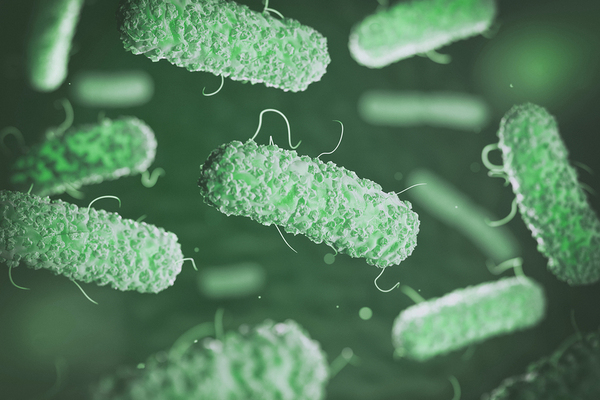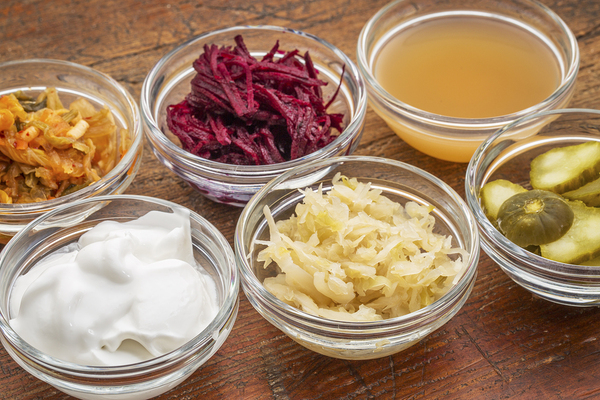


Less than a decade ago, the idea that the human body is made up of more microorganisms than human cells was not widely known. Today however, our microbiome (the totality of microorganisms living in and on our body and their collective genetic material) is one of the most popular topics in medical and genetic research, as evidenced by the formation of the Human Microbiome Project, by the NIH in 2007. Harmful bacteria are normally kept in check by good bacteria, which are known as probiotics. It is now well known that good microbes not only exist, but they are essential to good health. Normally, in our digestive systems, the good microbes outnumber the bad ones, and everything runs smoothly. But when the balance in the gut microbiome is out of whack, symptoms can range from unpleasant to dangerous. Probiotics are the helpful living microorganisms in your gut, but they can also be found in certain foods and in probiotic supplements. They’re essential not only to digestive health, but to your overall wellbeing, including your mental health. Here are 5 facts you should know about probiotics. 1. Much of Your Immune System Is Located in Your Digestive Tract Did you know that around three-fourths of your body’s immune system is located in your digestive tract? Not only that, the gut is responsible for generating 95% of your serotonin, and serotonin production can have a profound impact on mood and brain functioning. It’s no wonder the gut is considered a “second brain,” and why we often experience a “gut feeling” when it comes to emotional situations. Keeping your digestive microbiome in balance isn’t just good for digestion, but benefits your immune system response and even your mental health. 2. Foods Used to Naturally Contain More Probiotics Before modern food processing and preservation methods, probiotics were more prevalent in the typical diet. In simpler times, foods were produced from good, organic soil, and people learned to ferment many foods to keep them from going bad. Today, processes like refrigeration and food sanitation methods reduce the probiotics in the typical diet. Many meat-producing animals are raised taking antibiotics regularly, and fermentation is more of a dietary niche than the staple it once was. The result is that it’s easier for the modern digestive system microbiome to get out of balance, and we’re just beginning to understand the range of illnesses and conditions that can result.  Fermented foods like kimchi and sauerkraut can be good sources for health-promoting probiotics. 3. Many Typical Lifestyle Choices Kill Some of Our Naturally-Occurring Probiotics Often it is common, everyday lifestyle choices that end up killing off probiotics in the gut and throwing the microbiome out of balance, a condition known as dysbiosis. Overusing prescription antibiotics, consuming too much sugar and gluten, excessive emotional stress, lack of physical activity, and over-sanitation all result in killing off probiotics. Sometimes it seems as if modern life itself is antithetic to a healthy gut microbiome. But knowing what kills off probiotics makes it easier to adopt habits that encourage healthy probiotic growth. 4. Foods High in Probiotics are Easy to Find Many foods that contain probiotics are economical and easy to find or make. Sauerkraut, kimchi, kefir, kombucha and unpasteurized apple cider vinegar are all excellent sources of healthy probiotics. When choosing one of these fermented or cultured foods, select an organic or local brand. Many yogurts claim to be good sources of probiotics, but keep in mind that any food source that is pasteurized or heat treated in some other method, will contain little to no living microbes. 5. Choose Probiotic Supplements with Care Probiotic supplements are everywhere these days, but they vary significantly in quality. When you choose probiotic supplements, choose those with live bacteria. These generally have to be kept refrigerated. Many probiotics don’t offer the same benefits when freeze-dried as they do when delivered live. It’s also smart to choose supplements that include both Lactobacillus and Bifidobacterium. In combination, and at appropriate levels, these two probiotics offers different and complementary benefits. Probiotics used to be more readily present in ordinary people’s diets, and we can learn a lot from some of the older ways of doing things. Foods grown from healthy soils and fermented for preservation offer excellent probiotic benefits. Fortunately, when sufficient probiotic-containing foods aren’t available, supplements can fill that gap in supporting a healthy and balanced gut microbiome. If you have questions about probiotics or other aspects of healthy living, we encourage you to contact us at any time.
Fermented foods like kimchi and sauerkraut can be good sources for health-promoting probiotics. 3. Many Typical Lifestyle Choices Kill Some of Our Naturally-Occurring Probiotics Often it is common, everyday lifestyle choices that end up killing off probiotics in the gut and throwing the microbiome out of balance, a condition known as dysbiosis. Overusing prescription antibiotics, consuming too much sugar and gluten, excessive emotional stress, lack of physical activity, and over-sanitation all result in killing off probiotics. Sometimes it seems as if modern life itself is antithetic to a healthy gut microbiome. But knowing what kills off probiotics makes it easier to adopt habits that encourage healthy probiotic growth. 4. Foods High in Probiotics are Easy to Find Many foods that contain probiotics are economical and easy to find or make. Sauerkraut, kimchi, kefir, kombucha and unpasteurized apple cider vinegar are all excellent sources of healthy probiotics. When choosing one of these fermented or cultured foods, select an organic or local brand. Many yogurts claim to be good sources of probiotics, but keep in mind that any food source that is pasteurized or heat treated in some other method, will contain little to no living microbes. 5. Choose Probiotic Supplements with Care Probiotic supplements are everywhere these days, but they vary significantly in quality. When you choose probiotic supplements, choose those with live bacteria. These generally have to be kept refrigerated. Many probiotics don’t offer the same benefits when freeze-dried as they do when delivered live. It’s also smart to choose supplements that include both Lactobacillus and Bifidobacterium. In combination, and at appropriate levels, these two probiotics offers different and complementary benefits. Probiotics used to be more readily present in ordinary people’s diets, and we can learn a lot from some of the older ways of doing things. Foods grown from healthy soils and fermented for preservation offer excellent probiotic benefits. Fortunately, when sufficient probiotic-containing foods aren’t available, supplements can fill that gap in supporting a healthy and balanced gut microbiome. If you have questions about probiotics or other aspects of healthy living, we encourage you to contact us at any time.